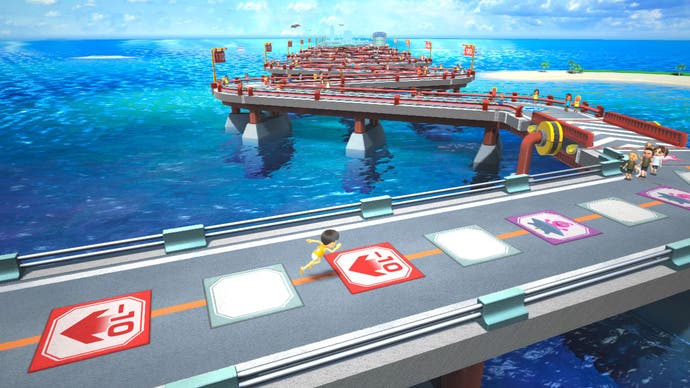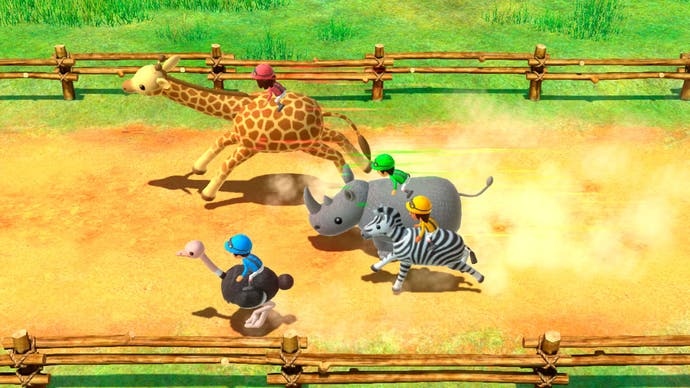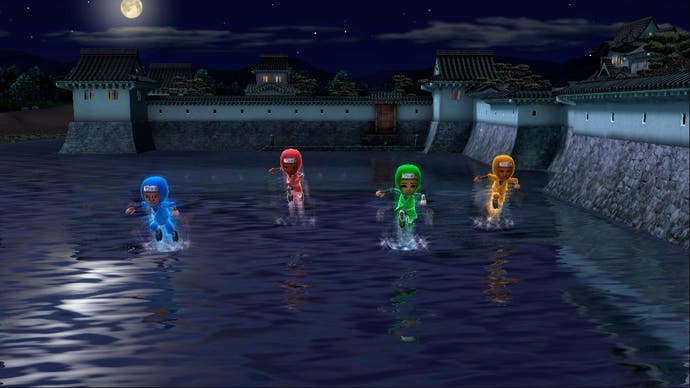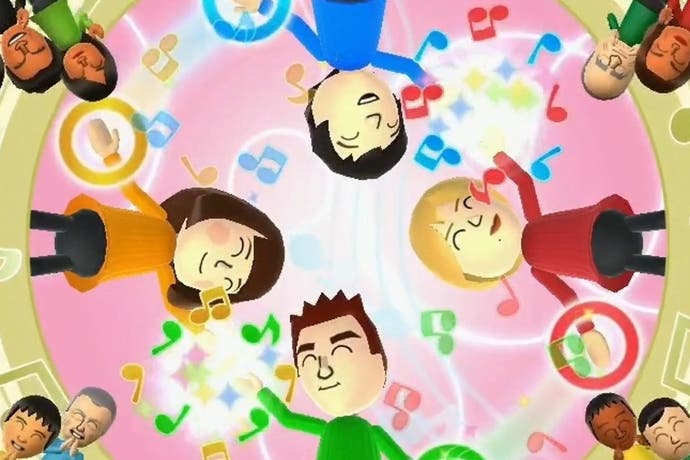Wii Party U review
Instant Mii play.
Imagine you've recently made a new friend. They're fun, a little different, slightly unsure of themselves, but a good laugh once you get to know them. They've invited you to a get-together at their place. But an old friend is back in town. Now this friend loves parties, and usually ends up the centre of attention - at least until they decided to take a step back from the limelight a couple of years back.
So you bring your old friend to your new friend's house, and spend almost all the time talking to them, laughing and enjoying yourselves, while your new friend sits in the corner, looking a little forlorn. You try to include them, but they insist they're fine and you should get back to your other friend - and yet you know they don't really mean it.
I felt oddly guilty at times while playing Wii Party U. For huge portions of this surprisingly generous game, The Wii U GamePad is worryingly neglected. 'Look at the TV', its screen insists. Don't worry about me, I'm fine, it seems to be saying, as it silently sulks by the canapés, looking on with envious eyes as you smile and cheer while clutching the Wii remote, your old friend.

The remote-centric modes in Wii Party U are the last remaining link to its Mario Party heritage, with several of them riffing on ideas from its immediate predecessor. Teammate Madness, which sees you picking a five-a-side football team according to the numbers and colours of their shirts, is basically Wii Party's Mii In A Row under a different name, albeit with a dash of poker thrown in - you'll line up pairs and straights and four-of-a-kind is usually enough to win the game. Highway Rollers is a literal extension of the board game template: a zig-zag dash down a lengthy track which sees the winner of each minigame rolling ten dice to advance. Mii Fashion Plaza asks you to run around a shopping precinct completing costumes, while The Balldozer is a coin-pusher variant my son succinctly described as "Tipping Point with balls".
Each of these modes has minigames in different concentrations: some make you play one after each turn, others only three times before the winner is declared. Only on GamePad island is the Wii U's controller included, and even then it's for nothing more than gimmicky ways of rolling the dice: stopping a spinning reel, shooting a cannon at numbered blocks, and so on. When the minigames start, it's back in the corner, idly nibbling on petits fours once more. No, really, I'm fine. Look at the TV.
If you fancy fewer breaks in the action, there's a suite of minigame-centric modes that frame the activities in a variety of ways. Dojo Domination asks you to beat 30 AI opponents in consecutive minigames, taking a piece from your life meter each time a rival places above you. Bridge Burners, meanwhile, asks you to work co-operatively towards increasingly challenging score targets, while the best of the bunch - a mode which a silly NDA restriction prevents us from talking about in detail - throws in an amusing wild card element.
"This isn't meant to be a game you plug away at for hours on end, trying to beat your high scores or to unlock additional stages. It's supposed to be a daft bit of throwaway entertainment for a gathering of family or friends.

Happily, the minigames are a pretty solid selection. They're all immediately accessible, their simple controls explained with the minimum of fuss, and you can have a dry run at any of them before you compete for real. There's a crisp, almost effortless breeziness to the presentation, with lots of charming visual touches, like the wide range of outfits your Miis wear for the different activities - from spacesuits to tuxedos, swimming trunks to chef hats. As a general rule of thumb, the best games tend to be the ones that have some kind of slapstick outcome, or the ones that prompt the losing Miis to slope off in a childish yet oddly charming sulk.
You'll play through the odd duffer, sure, but few of the activities take more than a minute to complete, and some are over within seconds. They're pleasingly varied, too: one minute you'll be dodging logs while riding a barrel down a river, the next you'll be racing an ostrich past a rhino on the home straight of a surreal safari derby. You can even offer your considered critical opinion on them afterwards, giving them a star rating that can be compared with other online players. The clear winner so far is the excellent Water Walkers, a race between four ninjas who must time their jumps perfectly to skip across the surface of a moonlit river.
The GamePad is almost reluctantly pressed into service in the eight House Party modes, almost all of which are over too soon (and certainly much quicker than the optimistic timescales stated in their descriptions). Name That Face asks you to take a photo of yourself pulling an expression described on the smaller screen, so players have to decide whether you've just taken a friend's chips or blown out a candle.

There's a neat twist on Pictionary where you're each given a short amount of time to sketch a picture; when the results are shown, players have to guess who got a different subject. Elsewhere, a strange folk dancing aside asks you to raise and lower remotes to the Tetris theme while looking down at instructions on the GamePad, which may present a problem to anyone who's both tall and slightly myopic. A game where you carry water from the GamePad to the TV screen is brief and underdeveloped - and useless to anyone without a moderately sized living room. Likewise, an oddly simplistic memory test that asks the GamePad player to complete fast food orders from instructions shouted out by others.
Things improve when you eventually give the GamePad your full attention. There's an oddly captivating game of baseball played using a single analogue stick each: you draw it back to pitch or to ready your bat, and release to throw or to swing. By accident or design, the comically rudimentary take on table football here is quite hilarious, as you clumsily slide your players around, usually scoring at least two own-goals per game. And then there's Tabletop Gauntlet, which is essentially a simultaneous two-player Screwball Scramble, and therefore unmissable.
There's not enough of it, perhaps, and the same could be said for most of Wii Party U's minigames and modes, even if there are plenty of them. And yet it's impossible to hold that shallowness against it. This isn't meant to be a game you plug away at for hours on end, trying to beat your high scores or to unlock additional stages. It's supposed to be a daft bit of throwaway entertainment for a gathering of family or friends, a game that anyone can pick up and play and have a good time with.
On those terms, it's hard to say Wii Party U isn't a success - and if that sometimes precludes the use of the funny-looking controller with all those sticks and buttons and the little screen in the middle, then so be it. It's a pity the GamePad is sidelined so often, but if doing so makes for a more accessible, inclusive party game - and let's be honest, it probably does - then it's a sacrifice worth making. Honestly, it'll be fine.

